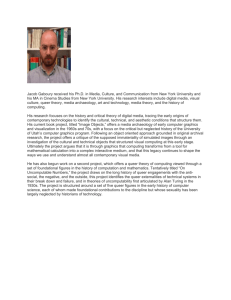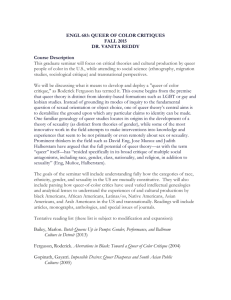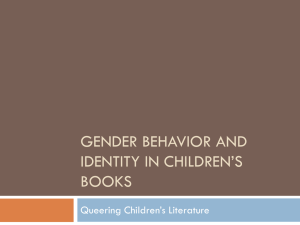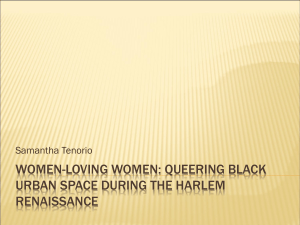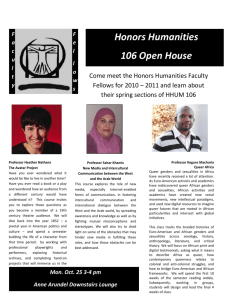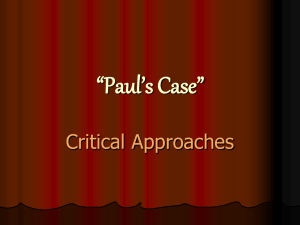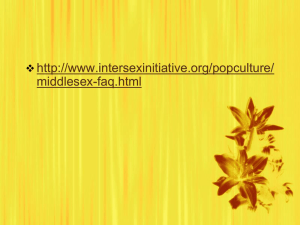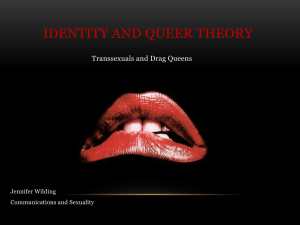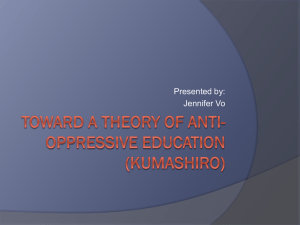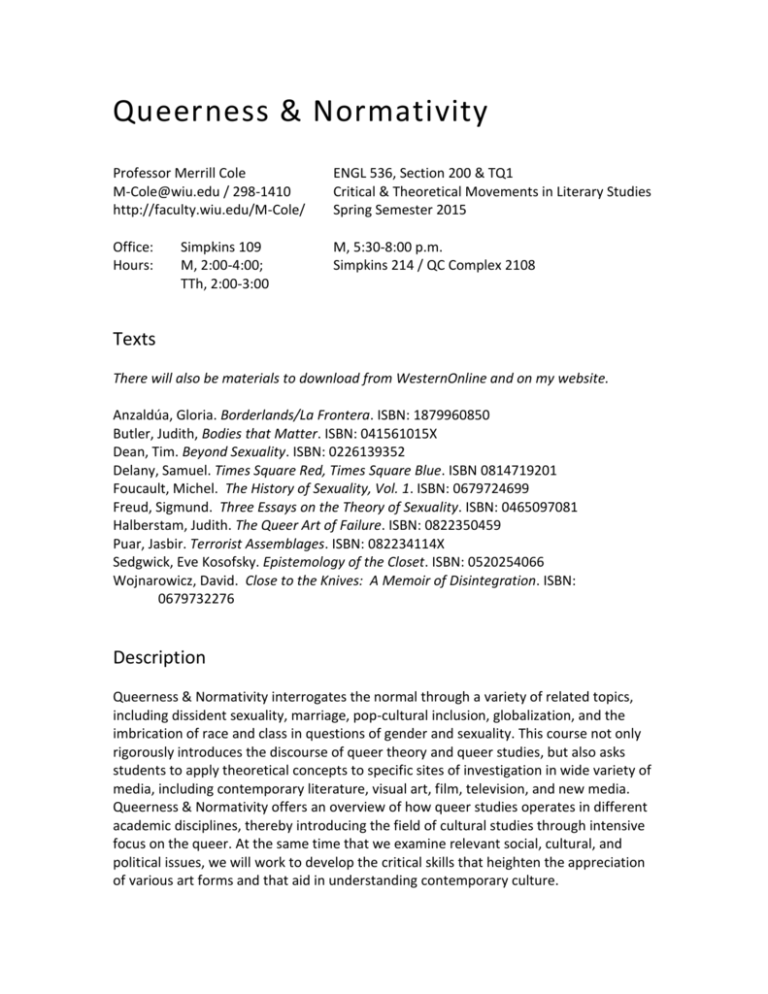
Queerness & Normativity
Professor Merrill Cole
M-Cole@wiu.edu / 298-1410
http://faculty.wiu.edu/M-Cole/
ENGL 536, Section 200 & TQ1
Critical & Theoretical Movements in Literary Studies
Spring Semester 2015
Office:
Hours:
M, 5:30-8:00 p.m.
Simpkins 214 / QC Complex 2108
Simpkins 109
M, 2:00-4:00;
TTh, 2:00-3:00
Texts
There will also be materials to download from WesternOnline and on my website.
Anzaldúa, Gloria. Borderlands/La Frontera. ISBN: 1879960850
Butler, Judith, Bodies that Matter. ISBN: 041561015X
Dean, Tim. Beyond Sexuality. ISBN: 0226139352
Delany, Samuel. Times Square Red, Times Square Blue. ISBN 0814719201
Foucault, Michel. The History of Sexuality, Vol. 1. ISBN: 0679724699
Freud, Sigmund. Three Essays on the Theory of Sexuality. ISBN: 0465097081
Halberstam, Judith. The Queer Art of Failure. ISBN: 0822350459
Puar, Jasbir. Terrorist Assemblages. ISBN: 082234114X
Sedgwick, Eve Kosofsky. Epistemology of the Closet. ISBN: 0520254066
Wojnarowicz, David. Close to the Knives: A Memoir of Disintegration. ISBN:
0679732276
Description
Queerness & Normativity interrogates the normal through a variety of related topics,
including dissident sexuality, marriage, pop-cultural inclusion, globalization, and the
imbrication of race and class in questions of gender and sexuality. This course not only
rigorously introduces the discourse of queer theory and queer studies, but also asks
students to apply theoretical concepts to specific sites of investigation in wide variety of
media, including contemporary literature, visual art, film, television, and new media.
Queerness & Normativity offers an overview of how queer studies operates in different
academic disciplines, thereby introducing the field of cultural studies through intensive
focus on the queer. At the same time that we examine relevant social, cultural, and
political issues, we will work to develop the critical skills that heighten the appreciation
of various art forms and that aid in understanding contemporary culture.
2
What are “Queer Studies”?
For cultural conservatives, these words signify at best the decline of humanistic study
into the trivial and the obscene, and at worst the recruitment of innocent youth into a
life of depravity, despair, and disease. Many self-identified lesbians, gay men, bisexuals,
and transgenders, moreover, object to the word, “queer.” Some argue that it has an
implicit masculine bias, like the word, “gay,” before it; others find it an ugly term of
derogation; still others see it as too inclusive, deeply uncomfortable with the fact that
certain practicing heterosexuals have appropriated “queer” as the adjective of choice
for their own activities. People outside of Anglo-American contexts object to the
imposition of foreign identity terms, arguing that these names erase cultural specificity.
Some critics also see “queer” as implicitly white. Often queer activists outside academia
disparage “queer studies,” along with its kissing cousin, “queer theory,” as ivory tower
mumbo-jumbo, useless to people’s everyday struggles. Even "queer studies" supporters
disagree about what this newly-emerging field should become.
There appears to be a broad consensus, nonetheless, that queer studies and queer
theory engage in the critique of the normal in all of its political, cultural, moral, and
scientific dynamics. “Queer” is used in the course title, rather than any other term,
because long lists of identity terms can be tiresome. If the course were titled the
unwieldy “Lesbian, Gay, Bisexual, and Transgender Studies & Normativity,” someone
would inevitably be excluded. What about, for instance, those who identity as “dykes,”
“bi-curious,” “questioning,” or “male lesbians”? And “Multiculturalism and Normativity”
would be too broad and just too bland. So why not "queer"? A curt monosyllable with
some edge, easily inflected with anger or curiosity, "queer" is versatile enough to serve
as noun, adjective, or verb. Once the homophobe’s favorite expletive, "queer" has
become the watchword of radical sexual politics.
“Queer" implies a different sexual politics than the older identity terms do, in part
because it entails the questioning of selfhood and its norms. Queer studies does not
simply affirm non-normative sexuality and fight against oppression, but interrogates the
meaning of human eroticism in all of its aspects. Part of the argument I hope to make
during the course of the semester is that queer studies, beyond its usefulness for sexual
minorities, has a lot to offer anyone who has an open mind and heart. Perhaps this
conjunction of sex and study appears nonsensical, or silly. Allow me to interpose the
words of Audre Lorde: “Our erotic knowledge empowers us, becomes a lens through
which we scrutinize all aspects of our existence, forcing us to evaluate those aspects
honestly in terms of their relative meaning within our lives. And this is a grave
responsibility, projected from within each of us, not to settle for the convenient, the
shoddy, the conventionally expected, nor the merely safe.”
3
Requirements
Every student will be responsible, at the end of the term, for 20+ page research essay
that engages theoretical texts and a site of investigation of the student's own choosing.
There will be several two-page assignments during the semester; and every student will
give two in-class, 10-minute presentations. Presentation materials will be handed in at
the end of class (or emailed). Ideally, at least one of the presentations will relate to the
research essay. There are slots in the schedule for particular presentation topics, but
students are also asked to design their own, second presentation. All writing must be
typed in a standard 12-point font. Writing that exceeds one page of length must be
stapled (unless emailed). As I will make local corrections on your work, I need to insist
that you double-space everything.
Students will be responsible for bringing discussion questions for each week’s readings.
These will not be collected, but participation will be carefully measured. Everyone must
participate. To participate actively means to keep up with the readings and to come to
class every session prepared with insights, arguments, and questions. Thus, it is very
much to your advantage to take notes as you read.
Please see <http://www.wiu.edu/provost/student/> for student rights and
responsibilities.
Please take the opportunity to meet with me during my office hours, or by appointment,
to talk about the readings, or about your writing. I can help you locate research texts
that may be valuable for your research project. I very much appreciate any kind of
feedback about the course, too.
Grading
Participation:
First Presentation:
Second Presentation:
Homework:
Research Essay:
20%
10%
10%
10%
50%
Up to two absences will be excused with proper documentation or advance warning
(i.e., the student presents a compelling reason not to come to particular class before the
session meets). However, a student with more than one unexcused absence will fail the
course. Plagiarism will also result in an F for the course, and I will report the student for
academic discipline. Unexcused absences, or arriving late, will affect the participation
grade.
4
Students with Disabilities
In accordance with University policy and the Americans with Disabilities Act (ADA), I will
make academic accommodations for any student who notifies me of the need. For me
to provide the proper accommodation(s), you must provide me documentation from
Disability Support Services. It is imperative that you take the initiative to bring such
needs to my attention, as I am not legally permitted to ask. Students who require special
assistance in emergency evacuations (i.e., fire, tornado, etc.) should tell me the most
appropriate procedures to follow. Please contact Disability Support Services at 2982512.
Schedule
Week 1:
January 26
Introduction to the course.
Film: Paris Is Burning.
Homework: Two-page response to the movie.
Week 2:
February 2
Three Essays on the Theory of Sexuality.
Judith Butler, ”Gender Is Burning,” in Bodies that Matter.
Student Presentations: Drag / Anti-gay violence.
Film: Tough Guise.
Homework: Two-page analysis of a single image of femininity from commercial media.
Week 3:
February 9
History of Sexuality: Volume I. WesternOnline: “Masculinity as Homophobia.”
Student presentations: Hegemonic Images of Masculinity / Hegemonic Images of
Femininity / New Masculinities.
Film Clip: The Chomsky-Foucault Debate.
On Screen: Tobaron Waxman.
Homework: Two-page response to Tobaron Waxman.
Week 4:
February 16
Borderlands/La Frontera.
Student presentations: Intersections of Sexuality & Race / Intersections of Sexuality and
Colonialism.
Film: Dangerous Living: Coming Out in the Developing World.
Homework: Two-Page Response to Anzaldúa.
5
Week 5:
February 23
Epistemology of the Closet, Preface, “Introduction: Axiomatic,” & “Epistemology of the
Closet.”
Student presentations: Male Homosexuality in Literature / Lesbianism in Literature.
Film: The Celluloid Closet (first half).
Handout: Amy Lowell, “In Excelsis.”
Homework: Two-Page Response to “In Excelsis.”
Week 6:
February 20
Close to the Knives, 1-137. WesternOnline: “The Spectacle of AIDS.”
Student presentations: The AIDS Crisis / LGBT Censorship in the USA.
On Screen: David Wojnarowicz’s artwork.
Film: The Celluloid Closet (second half).
Homework: Two-Page Response to The Celluloid Closet.
Week 7:
March 2
Close to the Knives, 138-276. WesternOnline: “Looking for Trouble” & “Robert
Mapplethorpe and the Discipline of Photography.”
Student presentations: LGBT Visual Artists / LGBT Musicians.
Film: Fire in My Belly.
Homework: Two-Page Response to Wojnarowicz.
Week 8:
March 9
Bodies that Matter, “Bodies that Matter,” “The Lesbian Phallus and the Morphological
Imaginary,” and “Phantasmatic Identification and the Assumption of Sex.”
Student presentations: Judith Butler, Celebrity / Trans.
On screen: Del LaGrace Volcano.
Homework: Formal proposal for the Research Essay.
Spring Break
Week 9:
March 23
Times Square Red, Times Square Blue, Part 1. WesternOnline: “Trading Places.”
Student presentations: Geographies of Desire / Queer Sociology.
Film: Queer Geography Tijuana.
Homework: Two-Page Personal Narrative.
Week 10:
March 30
Times Square Red, Times Square Blue, Part 2.
Student presentations: Gay Ghettos / Queer Subcommunities.
Film: Looking for Langston.
Homework: Two-page response to Tim Dean.
6
Week 11:
April 6
Beyond Sexuality, 1-93.
Student presentations: Queer Pedagogies.
Film: It’s Elementary.
Homework: Rewrite a fairy tale or nursery rhyme (two pages).
Week 12:
April 13
Beyond Sexuality, “Bodies that Mutter” & “Lacan Meets Queer Theory.” WesternOnline:
“Queercripped.”
Student presentations: Fairy Tales & Cultural Myths / Queerness & Disability.
Film: The Swan Prince.
Homework: Two-page response to Edelman.
Week 13:
April 20
Film: Other than the Others & Before Stonewall.
Student presentation: Life before Stonewall.
Week 14:
April 27
Terrorist Assemblages, through 113.
The Queer Art of Failure, through Chapter 2.
Student presentation: Trans Politics / Popular Culture
On Screen: TBA.
Week 15:
May 4
Terrorist Assemblages, 114-227.
The Queer Art of Failure, to end.
Final Exam Week
Research Essay due on Monday, May 11 by 2:00 p.m. (MS Word email submissions also
accepted).

